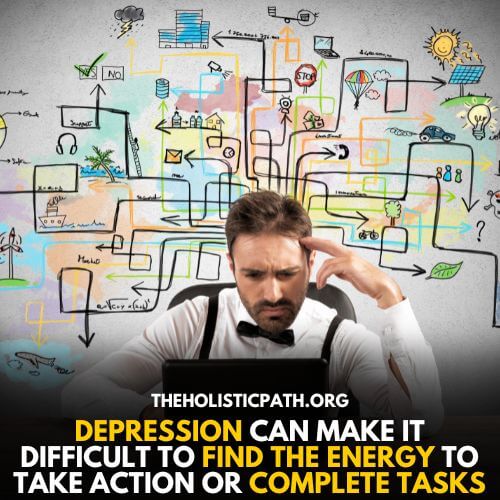We’ve all had days (or maybe weeks) where we just can’t seem to muster the motivation to do anything, no matter how much we want to. But is this lack of motivation more than just a normal slump, and is it a sign of something more serious like depression?
It can be hard to tell, especially if you try to put on a brave face and go about your normal routine. If you’re feeling particularly unmotivated, however, it is worth exploring if what is causing this is due to something deeper than being tired or uninspired.
This article will look at a lack of motivation as a sign of depression in detail and provide some tips on how to cope if you are experiencing the same challenges. So let’s explore is a lack of motivation a sign of depression…
Motivation: Why It’s Important To Address The Lack Of Motivation
Motivation is an essential trait, both in the workplace and in everyday life. It is important to address the lack of motivation because it can lead to a number of serious problems and negative outcomes. A lack of motivation can lead to decreased productivity, a drop in morale, and even physical and mental health issues.

At its core, motivation is all about creating a compelling reason for someone to take action.
It becomes especially important when faced with obstacles or tasks that appear too difficult to overcome. When there is no motivating force or goal in sight, it can be easy for someone to become overwhelmed and disheartened.
A lack of motivation often leads to decreased productivity. When people are not motivated, they may not put their full effort into completing tasks or meeting goals. This can ultimately lead to lower-quality work and fewer results being achieved.
In addition, unmotivated employees may become disengaged from their job, leading to increased absenteeism or tardiness. These issues can result in decreased productivity for companies and organizations, leading to financial losses as well as an impaired reputation for businesses.
Unmotivated employees can have a significant impact on morale in the workplace. Without enthusiasm or energy from staff members, working conditions can quickly become dull or uninspiring. This can lead to burnout among team members as they struggle with feeling demotivated while still having regular responsibilities that must be completed.
Furthermore, low morale often leads to poor customer service since employees can no longer provide the same level of attention or care when dealing with customers.
Research has shown that a lack of motivation can have serious repercussions on one’s physical and mental health if left unchecked over time. For example, prolonged feelings of dejection or frustration could lead to depression among individuals who feel overwhelmed by life’s obstacles without any drive or enthusiasm behind them.
Additionally, stress levels may increase due to the difficulty some have to maintain a positive attitude without proper motivation; this could lead to further physical health complications such as fatigue or trouble sleeping at night if left unchecked over time.
Addressing the lack of motivation is an essential step for both individuals and organizations alike due to its potential for causing decreased productivity at work as well as various physical and mental health complications down the line.
Is A Lack Of Motivation A Sign Of Depression?
Not feeling motivated can be a sign of depression. When you don’t feel like doing things, it might mean something deeper is going on. Depression is when you feel really sad and don’t enjoy life or what you do. It’s important to talk to someone if this happens so they can help.
Research has found that when people are depressed, they may have difficulty feeling motivated.
This is because depression can cause a sense of hopelessness and apathy, making it hard to find the energy or enthusiasm needed to take action. Furthermore, those with depression often experience feelings of worthlessness or guilt, which can affect their motivation levels even more as they struggle to complete tasks.
In addition to decreased motivation, other signs of depression include sleeping too much or too little, overeating or not eating enough, loss of interest in activities once enjoyed lack of concentration and persistent feelings of sadness or emptiness.
All these signs and symptoms of depression can make it hard to feel motivated. It can make you feel hopeless and too tired to do anything. It also makes you feel bad about yourself, which makes it harder to do things. When people are depressed, they might not want to do activities they usually like and may not be able to pay attention or concentrate.
This all leads to feeling unmotivated.
The Link Between Lack of Motivation And Depression
There is a strong link between a lack of motivation and depression. Depression can make it difficult to find the energy to take action or complete tasks, leading to decreased productivity and feelings of disengagement. Furthermore, those with depression may experience low self-esteem and guilt, further decreasing their ability to feel motivated or enthusiastic about activities or responsibilities.

Prolonged feelings of dejection can lead to serious physical and mental health consequences if left unchecked over time.
It is important for individuals who are feeling unmotivated to understand that this could be a sign of depression and seek help from a medical professional if necessary.
How Depression Affects Motivation Levels
Depression is a mood disorder that can have significant effects on an individual’s motivation levels. Here are some facts and points to consider:
- People with depression often experience feelings of sadness, hopelessness, and fatigue, which can make it difficult to find the energy and drive to complete tasks.
- Depression affects the brain’s reward system, reducing the release of dopamine, a neurotransmitter that plays a key role in motivation and pleasure.
- Negative self-talk and rumination are common in individuals with depression, leading to decreased self-esteem and confidence.
- Sleep disturbances are also common in people with depression, which can further impact energy levels and motivation.
- Depression may cause individuals to lose interest in activities they once enjoyed, leading to decreased motivation to engage in these activities.
- The lack of motivation associated with depression can lead to difficulties at work or school, strain relationships with loved ones, and impact the overall quality of life.
Overall, depression can significantly impact an individual’s ability to feel motivated and engaged in their daily life. Seeking treatment for depression is crucial for improving both mental health outcomes and overall quality of life.
How Lack Of Motivation Is A Common Symptom Of Depression
One common symptom of depression is a lack of motivation, which can make it difficult to complete daily tasks and engage in activities that were once enjoyable. Some possible reasons why depression can lead to decreased motivation include:
- Changes in brain chemistry: Depression can alter the levels of certain chemicals in the brain, such as dopamine and serotonin, which play a role in regulating mood and motivation.
- Negative thinking patterns: People with depression may experience negative thoughts about themselves, their abilities, and their future prospects. These thoughts can make it harder to feel motivated or see the point in trying.
- Fatigue and low energy: Depression can cause physical symptoms such as fatigue and low energy levels, which can make it hard to find the energy to do things.
The Role Of Neurotransmitters In Both Motivation And Depression
Neurotransmitters are chemical messengers in the brain that transmit signals between neurons. They play a crucial role in regulating many aspects of behavior, including motivation and mood.
Depression is a complex disorder that involves many different factors, including genetics, environment, and brain chemistry. Several neurotransmitters have been implicated in depression, including:
- Serotonin: Low levels of serotonin have long been associated with depression. Selective serotonin reuptake inhibitors (SSRIs), which increase serotonin levels in the brain, are commonly prescribed antidepressants.
- Norepinephrine: Like serotonin, low levels of norepinephrine have also been linked to depression. Some antidepressant medications target norepinephrine specifically.
- Dopamine: While dopamine is often associated with pleasure and reward, research suggests that dysregulation of the dopamine system may also play a role in depression.
Several neurotransmitters have been implicated in motivation, including:
- Dopamine: This neurotransmitter is often referred to as the “reward” neurotransmitter because it plays a key role in reinforcing behaviors that lead to pleasurable outcomes. It has also been linked to motivation, with higher levels of dopamine associated with increased willingness to work for rewards.
- Serotonin: This neurotransmitter is involved in regulating mood and emotional states, but it also plays a role in motivation. Research suggests that low levels of serotonin may be linked to decreased motivation and anhedonia (the inability to experience pleasure).
- Norepinephrine: This neurotransmitter is involved in the body’s “fight or flight” response, but it also plays a role in arousal and attention. Increased levels of norepinephrine have been linked to increased motivation and focus.
Neurotransmitters play a critical role in both motivation and depression. Understanding how these chemicals function can help us develop better treatments for mental health disorders like depression.
5 Types Of Activities That May Be Affected By Lack Of Motivation
Motivation is a crucial aspect of our daily lives that drives us to achieve our goals and fulfill our responsibilities. However, sometimes we may experience a lack of motivation, which can have a significant impact on different aspects of our lives.
Here are some of the daily life activities that may be affected by the lack of motivation:
1. Physical Activity:
One of the most common activities affected by a lack of motivation is physical activity. When experiencing depression, individuals may struggle to find the energy and motivation to exercise or engage in other forms of physical activity such as running, going to the gym, or playing sports.
This can lead to a decrease in physical fitness and an overall decline in health and well-being.
2. Social Engagement:
A decreased level of motivation can also affect an individual’s ability to engage in social activities, such as spending time with friends, going out for drinks or dinner, or participating in group activities. This can lead to feelings of isolation and further exacerbate symptoms of depression.

3. Work/Academic Performance:
Depression can also have a significant impact on work and academic performance.
Individuals who are struggling with depression may find it difficult to focus on tasks or stay motivated when faced with challenging goals. This can lead to decreased productivity and performance at work or school.
4. Creative Pursuits:
People with depression may also experience difficulty engaging in creative pursuits such as painting, writing, music, etc. A lack of motivation can make it hard to begin creative projects or sustain engagement over a long period of time.
This can lead to feelings of disappointment and dissatisfaction with one’s own creative output.
5. Personal Care:
Depression can also affect an individual’s ability to take care of their personal needs such as sleeping enough hours each night, eating well-balanced meals, taking the medication regularly if prescribed, attending therapy appointments (if applicable), etc. Without proper self-care practices in place, individuals are at risk for further mental health issues down the line.
Signs That Your Lack Of Motivation May Be Due To Depression
If you find that your lack of motivation is significantly impacting different aspects of your life, it could be a sign of depression. Here are some common symptoms associated with depression:
- Feelings of hopelessness or worthlessness
- Loss of interest in activities once enjoyed
- Changes in appetite or weight
- Difficulty sleeping or oversleeping
- Low energy levels and fatigue
- Difficulty concentrating or making decisions
- Suicidal thoughts or behavior
It’s important to seek help if you recognize any of these signs in yourself. A mental health professional can provide support, resources, and treatment options that may help improve your overall mood and level of motivation.
Common Symptoms Of Depression That Affect Motivation
Depression can manifest in a variety of different ways, and the symptoms associated with it can differ from person to person. Common symptoms that may affect motivation include:
- Feeling “stuck” or hopeless
- Experiencing difficulty making decisions
- Low energy levels and decreased physical activity
- Difficulty concentrating or focusing on tasks
- Loss of interest in activities once enjoyed
- Inability to plan for the future or set goals
If you find yourself struggling with any of these issues, be sure to reach out to your doctor or mental health provider for assistance.
Differences Between Temporary Lack Of Motivation And Chronic Lack Of Motivation Due To Depress
It’s natural to experience periods of low motivation throughout life. This can be due to a range of factors, such as stress, fatigue, or changes in the environment. A temporary lack of motivation is usually manageable and can be remedied through lifestyle adjustments like getting enough sleep, exercising regularly, eating nutritious meals, etc.
Chronic lack of motivation due to depression is more severe and lasts longer than temporary bouts of low motivation. It affects an individual’s ability to engage in activities that were formerly enjoyable or necessary for their well-being. If you find yourself struggling with chronic issues related to a lack of motivation, it may be time to seek help from a mental health professional.
Professional intervention can provide effective resources and treatment plans that can help promote better mental health and improved motivation.
Be sure to take action if you notice any changes in your motivation levels, as this may be a sign of depression. With the right help, long-term management of depression is possible, along with increased motivation and improved overall wellness.
Other Possible Causes of Lack of Motivation
In addition to depression, there are other possible causes of a lack of motivation. These may include:
- Lack of direction or purpose
- Unfulfilling work environment
- Stress and burnout
- Addiction issues
- Health problems (e.g., chronic pain)
It’s important to identify the underlying cause before attempting to address the issue of low motivation.
20 Coping Strategies for Lack of Motivation
If you find yourself struggling with low levels of motivation, there are some strategies that can help.

These may include:
- Change your environment: If you find yourself in a rut, sometimes all you need is a change of scenery. Even small changes, like working in a different room or taking a different route to work, can help break the monotony and give you a fresh perspective.
- Set smaller goals: When you’re feeling unmotivated, it can be helpful to set smaller goals rather than try to tackle everything at once. This way, you can feel a sense of accomplishment as you check items off your list, which will in turn boost your motivation.
- Find a buddy: Having someone to whom you’re accountable can be a great motivator. Whether it’s working out with a friend or having someone to review your work with, knowing that someone is counting on you can help you find the motivation to get things done.
- Take a break: Sometimes what you need to get motivated is simply some time away from whatever it is you’re trying to do. Step away for a few minutes or even an hour, and allow yourself to take some time to relax. Once you’ve had a chance to recharge, you may find it easier to jump back into your task with renewed energy.
- Give yourself a pep talk: It sounds silly, but sometimes all it takes is a little self-encouragement to get going. Talk yourself up – remind yourself of how capable and competent you are, and that you can handle anything that comes your way. This positive self-talk can help increase your motivation and confidence.
- Set deadlines: Having deadlines can help light a fire under you and provide the motivation needed to get things done. Make sure these deadlines are realistic, though, or else you may set yourself up for frustration and disappointment if you aren’t able to meet them.
- Create incentives: Offering yourself rewards for completing tasks can be an effective way to motivate yourself. Whether it’s something small, like taking a break after finishing a project, or something bigger, like treating yourself to a new outfit once you reach your fitness goals, giving yourself something to look forward to can help keep you on track.
- Visualize success: Picture yourself achieving your goal – what does it look like? How does it feel? Focusing on this positive image can help increase your motivation and drive toward making it happen in real life.
- Get organized: This one definitely depends on the person – some people work better when everything is in its place, while others prefer more chaos. But if being disorganized is what’s been holding you back, taking the time to get things in order may be just what you need to find the motivation needed to succeed.
- Make a plan: Having a plan of action mapped out can help give structure to your tasks and make them feel less daunting overall. Sometimes all it takes is seeing exactly what needs to be done (and when) in order to muster up the motivation required to get started.
- Exercising: Physical activity releases endorphins, which can increase energy levels, elevate mood, and restore motivation. Endorphins are chemicals in the brain that promote positive feelings such as happiness and euphoria. Exercise can also help to reduce stress and anxiety, which can be a source of a lack of motivation.
- Staying connected: Having strong social support networks can provide motivation during difficult times as well as give individuals someone to turn to in difficult times or when feeling low on motivation where they know they have reliable support systems which could potentially contribute towards increased or regained motivation levels.
- Focusing on positive outcomes: Focusing on positive outcomes rather than roadblocks ahead helps motivate individuals who may be experiencing a lack thereof. A positive outlook provides something tangible for them to strive towards while maintaining an optimistic outlook while doing so.
- Avoiding procrastination and distractions: Avoiding procrastination and distractions is key when it comes to regaining motivation. By staying on task, an individual can stay focused and avoid the potential for negative feelings which may arise related to a lack of progress or feeling overwhelmed. Additionally, avoiding distractions helps one remain focused on the task at hand.
- Taking time for reflection and gratitude: Taking time out to reflect and be grateful can help restore motivation. Taking the time to appreciate successes and focus on what goes right rather than what may have gone wrong helps an individual stay motivated and hopeful for the future. Additionally, reflecting on prior experiences can motivate individuals in order to not repeat previous mistakes or take wrong turns in their path toward success.
- Having a mentor: Having a mentor or someone to look up to provides an example of somebody who has achieved a goal similar to one’s own. This helps increase motivation by providing an example of how one may go about achieving their own goals while providing insight from another’s experience which could potentially make the process smoother and less daunting overall. Having a mentor also serves as both a source of motivation and a source of support during the journey toward achieving one’s goals. This is beneficial as it helps an individual stay on track while giving them assurance that they are not alone in their quest.
- Celebrating small wins: Celebrating small successes along the way can help to keep individuals motivated and focused on the end goal by providing rewards for progress made, even if this progress may appear insignificant. This serves to encourage individuals to continue striving towards their goals, no matter how small the victories seem along the way.
- Resetting expectations: Sometimes, expectations can be too high or unrealistic which may lead to feelings of frustration and lack of motivation when these expectations are not met. Therefore, resetting expectations to more manageable ones can help to increase motivation, as these expectations are now attainable and therefore provide a tangible goal for individuals to strive towards. Additionally, resetting expectations can help individuals develop resilience if faced with failure when attempting to reach the goals they have set. This kind of resilience is key in maintaining motivation long-term.
- Trying something new: Trying something new or taking up a hobby can be beneficial for motivation levels as it provides an individual with something different from what their daily routine entails which could potentially spark new interests and inspire creativity. This type of change not only helps break away from any monotony or boredom but also serves as a source of motivation by providing an avenue for self-expression and growth. This could be as simple as picking up a new hobby or taking on a new challenge which can both serve to increase motivation levels and provide an individual with something fresh to look forward to.
- Taking care of your mental and physical health: Taking care of one’s mental and physical health is key when it comes to regaining and maintaining motivation. Getting enough sleep, staying active, eating healthy, and engaging in activities one finds relaxing can all help contribute towards better overall well-being which in turn can help restore and maintain motivation levels. Additionally, incorporating self-care practices into one daily routine such as journaling, meditation, positive affirmations, etc., also helps boost mental health making it easier for individuals to stay motivated in the long term. Overall, taking care of oneself can help increase motivation levels and lead to better outcomes overall.
When to Seek Professional Help
It is important to remember that sometimes, no matter how hard one tries to increase their motivation levels, it may not be enough, and professional help may be necessary. If an individual is struggling with their mental health or feels like their lack of motivation is affecting other areas in life, then seeking help from a mental health professional should be considered as this could potentially make the difference between feeling stuck and finding renewed hope for the future.
Reaching out for help can seem daunting but there are many resources available both online and in person that can guide individuals toward finding support when they need it. Overall, recognizing when it’s time to seek professional help is key to maintaining motivation levels and overall well-being. This doesn’t mean failure but rather recognition of the importance of taking care of oneself.
Conclusion
All in all, is a lack of motivation actually a sign of depression, or is it just part of the everyday grind? While it is possible that depression is the cause, more often than not, your lack of motivation is an indicator of something else that either requires some lifestyle changes or taking a few days off for yourself. When in doubt, consult with a mental health expert who can help you get to the root of the problem and start feeling more motivated and alive again.
References
Grahek, I., Shenhav, A., Musslick, S., Krebs, R. M., & Koster, E. H. (2019). Motivation and cognitive control in depression. Neuroscience &Amp; Biobehavioral Reviews, 102, 371–381. https://doi.org/10.1016/j.neubiorev.2019.04.011
Dickson, J. M., Johnson, S., Huntley, C. D., Peckham, A., & Taylor, P. J. (2017). An integrative study of motivation and goal regulation processes in subclinical anxiety, depression, and hypomania. Psychiatry Research, 256, 6–12. https://doi.org/10.1016/j.psychres.2017.06.002
